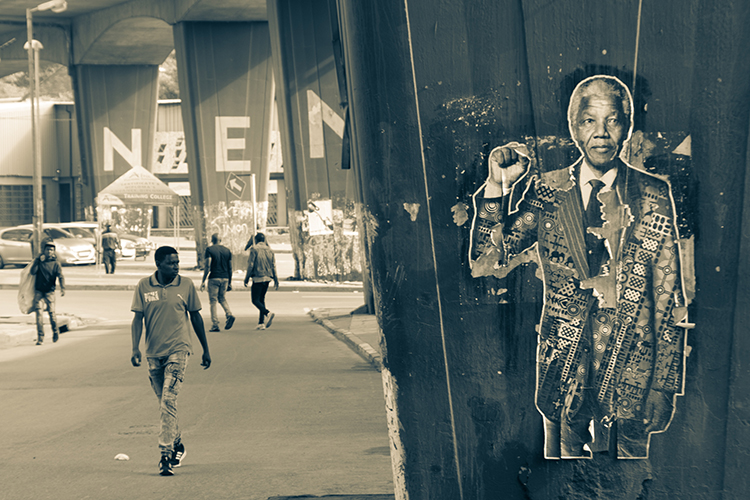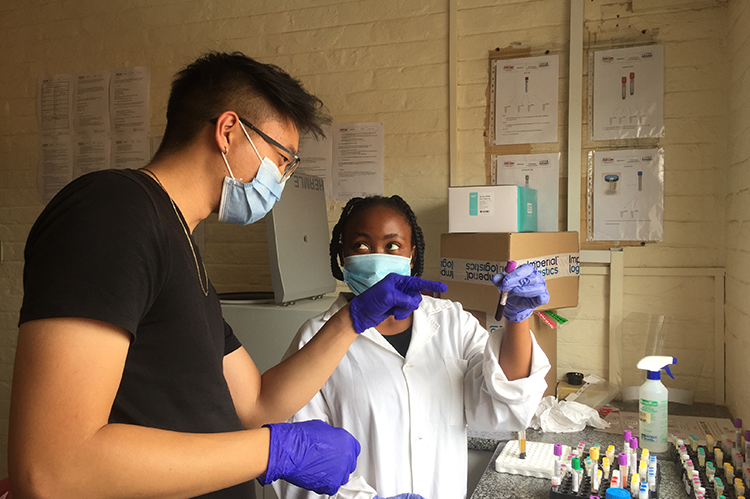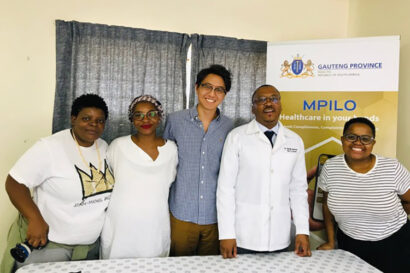On the Forefront of Genetics, Mental Illness and Trauma’s Lasting Effects

Andrew Kim’s mind raced as he entered the sprawling South African hospital. It was 2017, and Kim, at the time a Northwestern University biological anthropology graduate student, was researching how a woman’s stress while pregnant can affect the mental health of her child. It was exciting work with possible international implications, the type of big-picture research puzzle he had long dreamed of solving.
His mind teemed with questions: How would a Black South African mother’s trauma from apartheid three decades earlier shape the life of her child? How might racism, systemic oppression and other afflictions affect the ways a person’s body and brain respond to stress, disease and psychological disorders? And what can our individual stories teach us about mental illness?
Today, Kim is a recently hired assistant professor of biological anthropology at UC Berkeley who hopes his ever-expanding list of research projects will inspire mental health interventions and improve people’s lives — maybe even save them.

Kim’s work is the latest contribution to a fast-growing research field — intergenerational trauma — that is uncovering how large-scale trauma from atrocities like the Holocaust in Germany, Native American genocide in the U.S. and mass starvation in Ukraine has a ripple effect in families decades later. Scholars in fields from the social sciences to medicine are increasingly interested in how anxiety, depression and post-traumatic stress manifest from one generation to the next, years after a conflict’s formal conclusion. This work, along with the burgeoning field of epigenetics, which studies how our behavior and environment can affect gene expression, is attempting to uncover the most basic ways these types of stressors persist.
Researchers around the world already know there is an association. Their challenge has been proving the exact ways those traumas are transmitted — and how they affect a person’s mental health and physical well-being today.
And with historical racism hanging over the discipline of anthropology, asks Kim, “What does it look like for us to apply these lessons to our own discipline … to transform science that was once contributing to a very disgusting scientific practice?”
In his recently published study in The Journal Of Child Psychology and Psychiatry, Kim and colleagues found that prenatal exposure to discrimination and violence during the apartheid regime in South Africa predicted mental health problems among children born to younger mothers and youngsters whose households were particularly stressful.
In other words, greater stress on a mom-to-be who feared being arrested or beaten may have harmed her unborn child in ways that lingered into that offspring’s teenage or young adult years.
Kim’s is among the first intergenerational trauma projects to assess the long-term psychiatric effects of prenatal stress into one’s early adulthood in a low- and middle-income country, sometimes referred to as a developing country. It also spotlights a glaring need, Kim said, to address the legacies of colonialism and historical trauma to stem future mental health inequities.
Given the current interest in intergenerational trauma, an individual’s personal narrative that goes beyond technical and objective biological research can go a long way in helping to dispel damaging narratives, he said.
Chief among these falsehoods is the argument that we are prisoners of our past — something Kim said is both wrong and misses the point that there should be a focus on sustainable interventions to disrupt the cycle of trauma.
“I really want to frame this as an issue of health and social justice,” Kim said. “As a potential process of retribution for individuals who are historically affected by systems of oppression.”

‘Being an other in my community’
Kim learned at a young age what it meant to be an outsider.
Born in New York City to parents who immigrated to the U.S. from South Korea, Kim and his family moved to Athens, Georgia, when he was five years old. It was the late 1990s, but racism’s shadow loomed there, he said. He was one of the few Asian American kids in the Athens school system, and his family was among the handful of Asian families in town.
Kim learned early on that he couldn’t ignore his race and ethnicity. Now that he thinks about it, he said, his outsider perspective might have actually driven his interest in science, biology and society, a curiosity that tracks that of his father, a geneticist. As he progressed through high school, Kim said he started asking loftier questions like, “How does the environment shape human physiology?” and “How might it shape who we grow up to be?”
“I think it definitely came as a result of being an ‘other’ in my community of non-others, developing a hyperawareness of my experience and how others perceived me,” Kim said. “Being bicultural also allowed me to be reflexive and generate this cultural relativism, this ability to understand my beliefs and practices based on my two cultures.”
After completing his undergraduate studies at Emory University, Kim attended Northwestern, where he studied biological anthropology and the health consequences of societal oppression.
In 2017, Kim flew to Johannesburg, South Africa, for preliminary fieldwork with the Developmental Pathways for Health Research Unit at the University of the Witwatersrand. At the hospital in Soweto, he met researchers who had worked for years on The Birth to 30 study, a massive, long-term and ongoing project that enrolled more than 3,000 pregnant women during the waning days of apartheid, South Africa’s system of racial and political violence from 1948 until the early 1990s. Three generations of some families who have completed repeated surveys remain part of the study, the largest birth cohort study in Africa.
“Being bicultural also allowed me to be reflexive and generate this cultural relativism, this ability to understand my beliefs and practices based on my two cultures.”
– Andrew Kim
Using data spanning 304 mother-child pairs from that study, Kim and his colleagues ran a series of statistical analyses of survey data to examine how stress and trauma during pregnancy manifested in adolescence — a time in life when mental illnesses are more likely to appear.
They wanted to explore how biological processes involving stress hormones and the immune system facilitate trauma from one generation to the next. How, they wondered, did the effects of apartheid-era stress manifest themselves in children decades later? Did those stressors contribute to rates of mental illness? And perhaps most importantly, how might reparations and restorative justice help repair the damage?
By knowing these details, he said, students and researchers could improve access to regional mental health services for people, including those suffering from intergenerational trauma.
What was supposed to be a nine-month project that launched in earnest in September 2019, Kim said, stretched to two and a half years due to pandemic-induced research delays and travel restrictions.
But the results were compelling.
Greater prenatal stress exposure during apartheid was not directly associated with a greater prevalence of mental illness in the child, they found. That detail contradicts much of the work on prenatal stress and intergenerational trauma, which has generally found a direct relationship between such stress and psychiatric morbidity.

But that doesn’t mean they found nothing.
The age of the mother, coupled with past household adversity, “significantly moderated” mental health effects. Put another way, children born to younger mothers who experienced profound fears of being jailed or abused showed a higher prevalence of mental illness, Kim said. That was the case even after controlling for key demographic and socioeconomic variables, which are widely considered to explain a variety of youth outcomes.
Expectant mothers who experience certain stressors, Kim found, may be sensitizing their unborn children to unhealthy psychological reactions to stress, increasing their risk of psychiatric disease.
“Our findings provide early evidence,” he said, “that fetal development may be an important sensitive period for future psychiatric disease risk among children experiencing psychosocial stress during late adolescence and young adulthood.”
It was a surprising finding, Kim said. Given the tumultuous and violent conditions under apartheid, and previous research into the effects of intergenerational trauma, he thought it seemed logical that there would have been a significant effect in the mother-child pairs.
“However, 18 years is a long time, and these prenatal effects could have washed out throughout the life course,” Kim said. “The maternal age finding wasn’t surprising, given the ethnographic work. But the stress sensitization finding was surprising, since few studies have identified evidence for stress sensitization due to prenatal stress.”
Charting a path in search of deeper meaning
To Kim, the findings underscore a need to dig beyond surveys and data. It’s where his anthropological perspective and interest in interviewing people to craft rich narratives can help add layers to this often highly technical research discipline of intergenerational trauma.
Take, for example, a case Kim encountered of a mother and daughter with a strained relationship, Kim said. At first glance, biological tests might not signal trauma. But in-depth interviews revealed that the mother was forced to move from the family’s rural home to a more populated urban area. She left her daughter to be raised by a grandmother who was deeply involved in the fight against oppression. The grandmother sheltered anti-apartheid activists and even trained her young granddaughter how to fight.
The granddaughter developed a political passion and strong moral center, much like her grandmother. Meanwhile, the child’s mother turned away from radical politics. And all were exposed to some degree of apartheid-induced trauma causing a familial rift that unfolds across the country — one that should not be discounted.
“Just because we’re traumatized in the past doesn’t mean that we will be traumatized for the rest of our lives.”
– Andrew Kim
“When you think about how intergenerational trauma manifests, it’s not just this biological embodiment of stress or trauma that gets biologically embedded through epigenetics or hormones,” Kim said. “It’s a much more complex and, frankly, political story.”
Teen moms in his research study, Kim found, also faced shame and stigma as a result of giving birth at such a young age — a stigma that came from multiple parts of their lives, including from their own family members, the community and even nurses at the hospital.
Mixing ethnography with statistical tests is rather rare, Kim said. But it’s invaluable.
“I was kind of charting my own path,” he said of his decision to mix the two methods. And it led him to one clear takeaway that applies in South Africa and beyond: Sustained periods of safety and economic security can have lasting impacts on health, which is why it’s so important for medical professionals to be aware of the socio-political powers that affect women and marginalized people more broadly.
Stemming that trauma requires quality interventions like therapy and medication. Options are often sorely lacking. Only 8% of people in South Africa who need psychiatric care receive it, Kim said. It’s slightly improved in the U.S., he added, although major gaps remain in an overburdened and underresourced mental health care system.
Kim has no shortage of future research project ideas and gives an exasperated laugh when asked about what’s next: a series of reports about health care worker coping strategies during the pandemic, a piece on the health impacts of the pandemic on patients, and a project on intergenerational trauma related to the U.S. government’s child separation policies.
Solutions, Kim said, are at the heart of his work.
They’re out there. It’s just a matter of asking the right questions.
“Just because we’re traumatized in the past,” Kim said, “doesn’t mean that we will be traumatized for the rest of our lives.”
